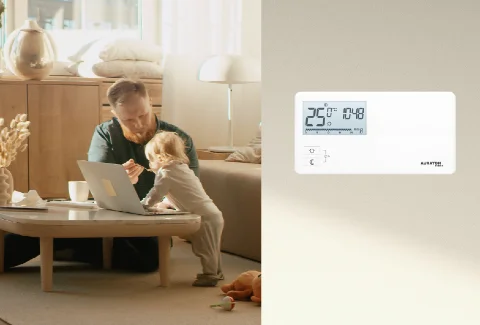Latest Posts

AURATON Fenix SET – intelligent heating control for every home

AURATON Smart and SUPLA: Your Path to a Smart Home

Defining Success Across Generations declaration
Refrigerant R32
Refrigerant R32
Why does heat pump need a refrigerant?
Heat pumps consist of two main components: an indoor unit and an outdoor unit, which work together to provide both cooling and heating.
During the cooling mode, the heat pump absorbs heat from the indoor air and releases it outside, thus cooling the indoor space. The outdoor unit acts as the “cooler” in this process. It contains a compressor, a condenser coil, and a fan. The compressor pressurizes the refrigerant, which then circulates through the condenser coil. The fan blows air over the condenser coil, transferring heat from the refrigerant to the outdoor air and effectively cooling the refrigerant.
The cooled refrigerant then flows back to the indoor unit, where it passes through an expansion valve, which reduces its pressure. As the refrigerant evaporates in the indoor coil, it absorbs heat from the indoor air, thus cooling the air that is distributed into the living space.
In the heating mode, the heat pump operates in reverse. It extracts heat from the outdoor air (even in cold temperatures) and transfers it to the indoor space, providing warmth. In this mode, the outdoor unit acts as the heat source, while the indoor unit acts as the heat distribution system.
The choice of refrigerant is important, as different refrigerants have varying thermodynamic properties and environmental impacts. It is crucial to consider refrigerants with low global warming potential (GWP) and comply with regulatory standards to minimize environmental harm.
What is R32?
R32 symbol typically refers to an air conditioning or heat pumps systems that use the refrigerant R32. R32 is a hydrofluorocarbon (HFC) refrigerant that has gained popularity as a replacement for older refrigerants with higher global warming potential (GWP). It is considered to have a lower environmental impact compared to some other commonly used refrigerants.
R32 coolers are designed to provide cooling for indoor spaces, such as homes, offices, or commercial buildings. These systems work by circulating the R32 refrigerant between an indoor unit and an outdoor unit. The refrigerant absorbs heat from the indoor air and carries it to the outdoor unit, where it releases the heat to the outside environment.
R32 refrigerant is known for its energy efficiency and effectiveness in cooling. They are also considered more environmentally friendly than older refrigerants due to their lower GWP. It’s worth noting that R32 is a mildly flammable refrigerant, therefore proper safety measures need to be taken during installation and maintenance.
It’s important to consult with a professional HVAC technician or refer to the manufacturer’s specifications to get accurate information on the specific features and capabilities of R32 coolers, as different models and brands may have variations in terms of performance and design.
What refrigerants used in heat pumps are legal in the EU?
In September 2021, the European Union (EU) has implemented regulations to limit the use of refrigerants with high global warming potential (GWP). The two main refrigerants commonly used in heat pumps that meet EU regulations are:
- R410A (Azeotropic Mixture): R410A is a blend of hydrofluorocarbons (HFCs) and is widely used in heat pump cooling systems. However, due to its high GWP, it is being phased out in the EU. From January 1, 2025, the use of new equipment containing R410A with a GWP above 750 will be banned.
- R32 (Difluoromethane): R32 is a single-component HFC refrigerant with a lower GWP compared to R410A. It has gained popularity as a more environmentally friendly alternative. Many manufacturers have started producing heat pumps that use R32 as the refrigerant, as it is compliant with EU regulations.
It’s important to note that regulations and standards can change over time. Therefore, it’s advisable to consult the latest regulations and guidelines from relevant EU authorities or consult with a professional in the HVAC industry to ensure compliance with current legal requirements for heat pump coolers in the EU.
Should I change a heat pump with R410A refrigerant to a newer one?
Whether or not you should change your heat pump with an R410A cooler to a newer one depends on several factors. Here are some considerations to help you make an informed decision:
- Efficiency and Performance: Newer heat pump models often come with improved efficiency and performance compared to older models. Upgrading to a newer heat pump could result in energy savings and better cooling/heating performance. Consider the age of your current heat pump and whether it still meets your comfort needs.
- Environmental Impact: R410A has a high global warming potential (GWP), and its use is being phased out in many regions, including the EU. If environmental concerns are important to you, upgrading to a heat pump that uses a lower-GWP refrigerant like R32 or a more environmentally friendly alternative may be beneficial.
- Cost Considerations: Upgrading to a newer heat pump will involve an initial investment. Consider the cost of purchasing and installing a new unit compared to potential energy savings and environmental benefits over the lifespan of the new heat pump. Additionally, check if there are any incentives, grants, or tax credits available for upgrading to a more energy-efficient system. Using aids and donation can speed up your ROI and make your home more energy saving.
- Compatibility and Retrofitting: When considering a new heat pump, ensure that it is compatible with your existing ductwork, electrical system, and other infrastructure. Retrofitting can sometimes be an option, but it may add additional costs and complexities to the installation process.
- Future Regulations: Consider the future regulatory landscape. If your current heat pump uses R410A, which is being phased out, it may become more difficult and expensive to maintain or repair in the future. Upgrading to a heat pump with a refrigerant that meets current and future regulations can provide peace of mind.
If you still don’t know whether it is worth to change your current heat pump, consult with a professional HVAC technician who can assess your situation and provide guidance based on your needs, budget, and the available options in your region. They can help you evaluate whether upgrading to a newer heat pump is the right choice for you.



